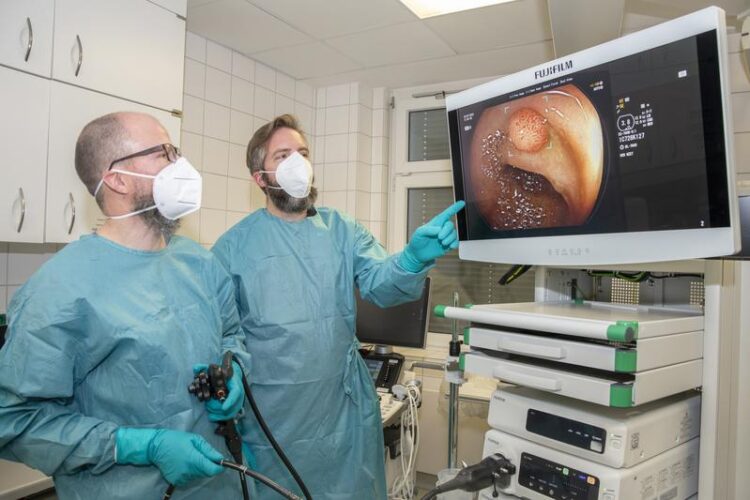AI improves colorectal cancer screening in Lynch syndrome

Study - AI-assisted colonoscopy improves surveillance of colorectal cancer in patients with Lynch syndrome: (from left) Prof. Jacob Nattermann and Dr. Robert Hüneburg in the endoscopy.
Credit: Rolf Müller / University Hospital Bonn (UKB)
First study of AI-assisted colonoscopy for colorectal cancer surveillance in patients with genetic predisposition – People with Lynch syndrome have a higher hereditary risk of colon cancer. Despite regular endoscopic surveillance, it remains elevated in those affected. Researchers at the National Center for Hereditary Tumor Diseases (NZET) at Bonn University Hospital (UKB) have now found that artificial intelligence (AI) can improve the effectiveness of colonoscopy in the presence of Lynch syndrome. The study results have been published online in the United European Gastroenterology Journal.
Hereditary non-polyposis colorectal cancer (HNPCC)” – Lynch syndrome (LS) for short – is the most common hereditary colorectal cancer syndrome. Based on estimates, it is believed to affect approximately 300,000 individuals in Germany alone. LS is responsible for about two to three percent of all colon cancers. It is triggered by defects in genes responsible for repairing the human genetic material DNA. Children of those affected have a 50 percent risk of also having the pathologically altered hereditary disposition, technically known as a mutation, and thus also a high risk of developing colon cancer at a young age.
Therefore, regular monitoring by means of colonoscopy is recommended here every one to two years. “However, despite such regular endoscopic monitoring, the risk of colorectal cancer remains elevated in those affected,” says Prof. Jacob Nattermann, head of the Hepatogastroenterology Section at UKB’s Medical Clinic I (Director: Prof. Christian Strassburg). The researchers explain this by the fact that colonoscopy still misses a considerable number of adenomas, the potential precursors of colorectal cancer. “Small and flat adenomas in particular are at risk of being overlooked even by experienced gastroenterologists,” says Prof. Nattermann.
Increase adenoma detection rate
Recent data suggest that artificial intelligence (AI)-assisted colonoscopy, also known as computer-aided detection (CADe), may help increase adenoma detection rates (ADR) in the general population. “Therefore, the aim of our study was to evaluate the diagnostic performance of AI-assisted colonoscopy in patients with Lynch syndrome,” says Robert Hüneburg, senior physician at UKB’s Medical Clinic I. Thus, in close collaboration with the Institute of Medical Informatics, Statistics and Epidemiology at the University of Leipzig, 46 LS patients were studied using standard endoscopy and 50 LS patients with AI-assisted colonoscopy between December 2021 and December 2022. Here, significantly more of the AI-assisted examinations (36 percent) detected adenomas than the standard examinations (26.1 percent). “This was mainly due to significantly improved detection of flat adenomas,” Hüneburg says. In summary, this study was the first in the world to collect data suggesting that AI-assisted real-time colonoscopy is a promising approach to optimize endoscopic surveillance of LS patients, especially to improve detection of flat adenomas. “Due to the small sample size, based on these results, a larger multicenter study is now planned under the leadership of our department,” said Prof. Nattermann.
Publication:
Hüneburg, Robert, et. al: Real-time use of artificial intelligence (CADEYE) in colorectal cancer surveillance of patients with Lynch syndrome – a randomized controlled pilot trial (CADLY) / Running title: AI assisted colonoscopy in Lynch syndrome; United European Gastroenterology Journal; https://doi.org/10.1002/ueg2.12354
Scientific contact:
Dr. Robert Hüneburg
National Center for Hereditary Tumor Syndromes (NZET)
Senior physician at the Medical Clinic I
Bonn University Hospital
Tel.: +49/228/28715260
Email: Robert.Hueneburg@ukbonn.de
Press contact:
Dr. Inka Väth
Deputy Press Officer at the University Hospital Bonn (UKB)
Communications and Media Office at Bonn University Hospital
Phone: +49 228 287-10596
E-mail: inka.vaeth@ukbonn.de
About the University Hospital Bonn: The UKB cares for about 500,000 patients per year, employs 8,800 people and has a balance sheet total of 1.5 billion euros. In addition to the more than 3,300 medical and dental students, a further 580 women and men are trained each year in numerous healthcare professions. The UKB is ranked first among university hospitals in NRW in the science ranking, has the third highest case mix index in Germany and was the only one of the 35 German university hospitals to increase its performance in the Corona years 2020 and 2021.
Wissenschaftliche Ansprechpartner:
Hüneburg, Robert, et. al: Real-time use of artificial intelligence (CADEYE) in colorectal cancer surveillance of patients with Lynch syndrome – a randomized controlled pilot trial (CADLY) / Running title: AI assisted colonoscopy in Lynch syndrome; United European Gastroenterology Journal; https://doi.org/10.1002/ueg2.12354
Originalpublikation:
Dr. Robert Hüneburg
National Center for Hereditary Tumor Syndromes (NZET)
Senior physician at the Medical Clinic I
Bonn University Hospital
Tel.: +49/228/28715260
Email: Robert.Hueneburg@ukbonn.de
Media Contact
All latest news from the category: Studies and Analyses
innovations-report maintains a wealth of in-depth studies and analyses from a variety of subject areas including business and finance, medicine and pharmacology, ecology and the environment, energy, communications and media, transportation, work, family and leisure.
Newest articles

Innovative 3D printed scaffolds offer new hope for bone healing
Researchers at the Institute for Bioengineering of Catalonia have developed novel 3D printed PLA-CaP scaffolds that promote blood vessel formation, ensuring better healing and regeneration of bone tissue. Bone is…

The surprising role of gut infection in Alzheimer’s disease
ASU- and Banner Alzheimer’s Institute-led study implicates link between a common virus and the disease, which travels from the gut to the brain and may be a target for antiviral…

Molecular gardening: New enzymes discovered for protein modification pruning
How deubiquitinases USP53 and USP54 cleave long polyubiquitin chains and how the former is linked to liver disease in children. Deubiquitinases (DUBs) are enzymes used by cells to trim protein…



